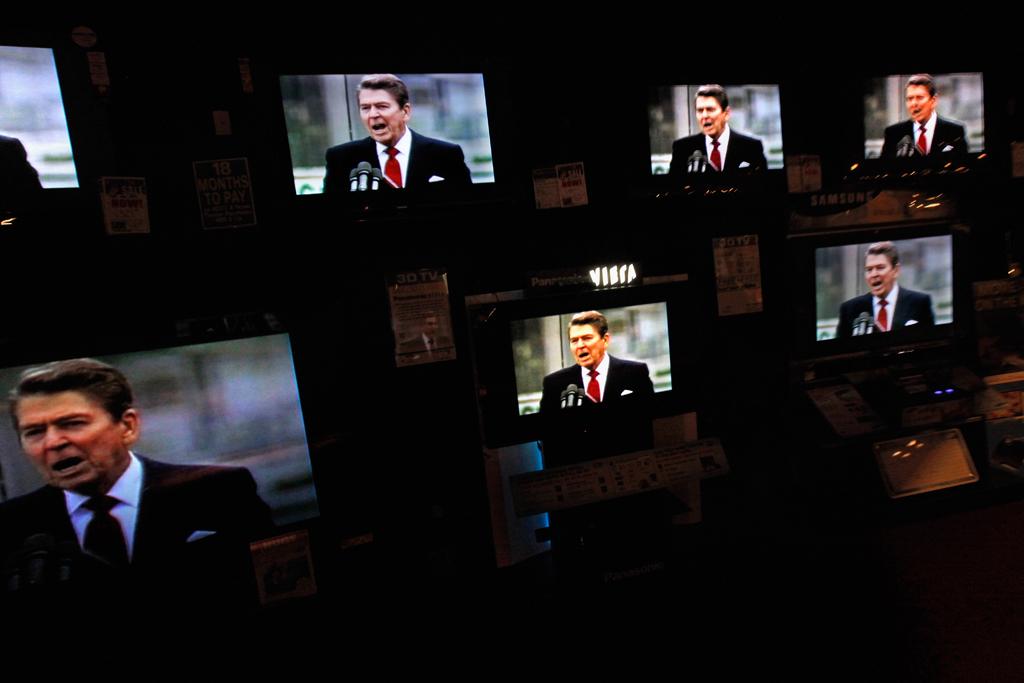Opinion: What really causes US electoral corruption
Dozens of televisions display a political advertisement with the image of former President Ronald Reagan, Dec. 27, 2011 in Urbandale, Iowa.
LONDON, UK — Despite all the outrage and finger pointing about the role being played by big money in the Republican primaries, the mainstream media rarely mention the principal reason why American elections have come to look like auctions in which the White House and Congressional seats go to the highest bidder.
It’s not only the fault of fat cats and special interest groups who buy influence with campaign contributions. Nor is it the politicians who gladly take their money and end up in their pockets. You don’t have to be a cynic to conclude that they are just doing what comes naturally.
Money talks, and two US judicial decisions in 2010 gave it a megaphone by allowing certain fund-raising committees known as “superPACS” to spend unlimited amounts of cash supporting parties and candidates. That has made the already deplorable practice of influence buying far worse.
More from GlobalPost: Five highlights from the Florida debate
But it wasn’t big money, compliant politicians or the courts who created the system.
The real reason why the American electoral process has been corrupted is so obvious that no wants to notice it. The elephant in the room is television and the rules that govern it.
Don Hewitt, a pioneering CBS News broadcaster, described how it all began in 1960 when he produced the famous television debate between Richard Nixon and John F. Kennedy.
That was the night the politicians looked at television and said, "Those guys are the only way to run for office." And we looked at them and said, "These guys are a bottomless pit of advertising dollars." And from that moment on, the No. 1 qualification in the world’s greatest democracy is the ability to raise money for television time.
Television in America developed as primarily a commercial enterprise paid for by advertising.
The Federal Communications Commission requires that broadcast stations provide “reasonable access” to candidates for federal elective office, and gives them discretion as to whether to sell time to candidates in state and local elections. The broadcasters needed no encouragement.
Political ads became an election year bonanza for the owners of television stations.
More from GlobalPost: Newt Gingrich promises a Moon base by 2020
By contrast, European television until recent years was primarily government owned and controlled. Most west European countries ban paid TV political ads on the grounds that they would give well-funded parties an unfair advantage.
Instead, parties are given free airtime for short political broadcasts. The broadcasters are usually reimbursed for the technical costs of running the ads, but the amounts they can claim are peanuts compared to the rates for normal commercial advertising spots.
Having sat through a number of these unpaid political ads, I can confirm they are polite and boring. The rules that govern them would not permit the sleazy innuendo, half-truths and calumnies that make American political ads so outrageous — and effective.
One argument often raised by American broadcasters in defense of their system is the First Ammendment. But any candidate who has begged for millions of dollars in order to pay for TV time knows that “freedom of speech” does not mean “free speech.”
I have asked the question many times: Would a system that gives political parties free television time for election ads stem the corruption in US politics?
Most American politicians think it would go a long way toward cleaning up the mess. But they always add that it’s not likely to be adopted in America. The broadcasters are too powerful.
It would certainly lower the money barrier for entry into politics and probably give American voters a wider and better choice of candidates. If the current campaign is any indication of the state of American politics, the system is seriously broken and urgently needs fixing.
Maybe it’s time to acknowledge the elephant in the room and do something about it.
We want to hear your feedback so we can keep improving our website, theworld.org. Please fill out this quick survey and let us know your thoughts (your answers will be anonymous). Thanks for your time!
